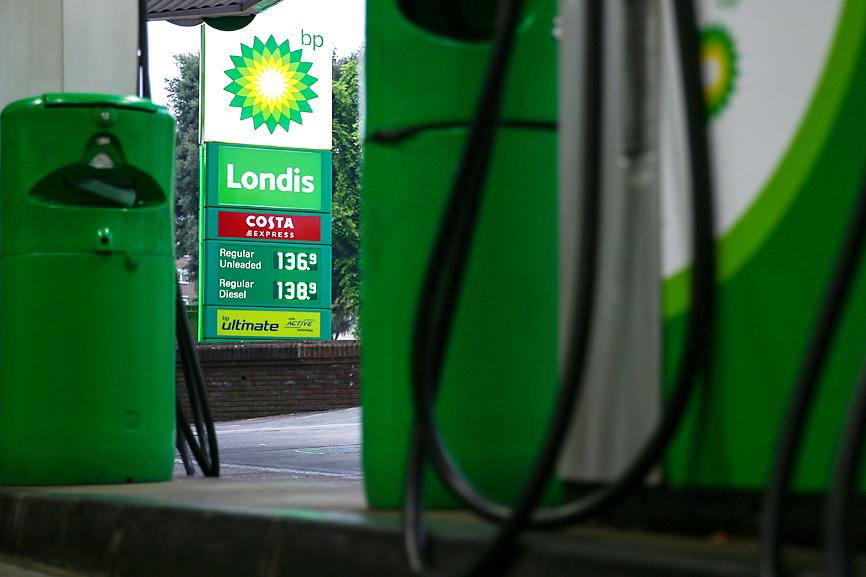BP PLC returned to profit in the second quarter, the British energy giant said yesterday, having posted a hefty loss one year earlier as lockdowns amid the COVID-19 pandemic crushed oil prices.
Net profit for the April-to-June period was US$3.1 billion. That compared with a loss after tax of US$16.8 billion in the second quarter of last year.
With demand for crude crashing early last year amid the pandemic, oil prices plunged into negative territory. They have since recovered, currently trading above US$70 per barrel.

Photographer: Hollie Adams/Bloomberg
Oil demand was recovering on “a bright macroeconomic outlook, increasing vaccination roll-out and gradual lifting of COVID-19 restrictions around the world,” BP said in its results statement. “The expectation is that demand reaches pre-COVID levels sometime in the second half of 2022.”
In the wake of the pandemic, BP announced that it would cut about 10,000 jobs, or 15 percent of its global workforce, while it embarked upon major asset disposals.
BP yesterday said that it had completed deals on divestments totaling US$14.9 billion out of a target of US$25 billion.
That comes as BP chief executive officer Bernard Looney said the company aims to achieve “net zero” carbon emissions by 2050.
It hopes to achieve this with the help of an expected drop in oil and gas production that is pushing energy majors worldwide to improve their performance regarding cleaner, sustainable energy sources such as electricity and wind power.
“We are a year into executing BP’s strategy to become an integrated energy company and are making good progress — delivering another quarter of strong performance while investing for the future in a disciplined way,” Looney said in Tuesday’s statement.
BP also said it was hiking its shareholder dividend and launching a buyback of shares totaling US$1.4 billion.
The company will increase its dividend by 4 percent to US$0.0546 a share and buy back US$1.4 billion of stock in the third quarter, Looney said.
“What you’re seeing around the dividend is really a story of confidence,” Looney said in a Bloomberg television interview. “Confidence in the underlying performance of the business, confidence in the balance sheet.”
If oil averages about US$60 a barrel, BP expects to be able to continue increasing its dividend by about 4 percent annually and repurchase US$1 billion of shares each quarter until 2025, he said.

To many, Tatu City on the outskirts of Nairobi looks like a success. The first city entirely built by a private company to be operational in east Africa, with about 25,000 people living and working there, it accounts for about two-thirds of all foreign investment in Kenya. Its low-tax status has attracted more than 100 businesses including Heineken, coffee brand Dormans, and the biggest call-center and cold-chain transport firms in the region. However, to some local politicians, Tatu City has looked more like a target for extortion. A parade of governors have demanded land worth millions of dollars in exchange

An Indonesian animated movie is smashing regional box office records and could be set for wider success as it prepares to open beyond the Southeast Asian archipelago’s silver screens. Jumbo — a film based on the adventures of main character, Don, a large orphaned Indonesian boy facing bullying at school — last month became the highest-grossing Southeast Asian animated film, raking in more than US$8 million. Released at the end of March to coincide with the Eid holidays after the Islamic fasting month of Ramadan, the movie has hit 8 million ticket sales, the third-highest in Indonesian cinema history, Film

Taiwan Semiconductor Manufacturing Co’s (TSMC, 台積電) revenue jumped 48 percent last month, underscoring how electronics firms scrambled to acquire essential components before global tariffs took effect. The main chipmaker for Apple Inc and Nvidia Corp reported monthly sales of NT$349.6 billion (US$11.6 billion). That compares with the average analysts’ estimate for a 38 percent rise in second-quarter revenue. US President Donald Trump’s trade war is prompting economists to retool GDP forecasts worldwide, casting doubt over the outlook for everything from iPhone demand to computing and datacenter construction. However, TSMC — a barometer for global tech spending given its central role in the

Alchip Technologies Ltd (世芯), an application-specific integrated circuit (ASIC) designer specializing in server chips, expects revenue to decline this year due to sagging demand for 5-nanometer artificial intelligence (AI) chips from a North America-based major customer, a company executive said yesterday. That would be the first contraction in revenue for Alchip as it has been enjoying strong revenue growth over the past few years, benefiting from cloud-service providers’ moves to reduce dependence on Nvidia Corp’s expensive AI chips by building their own AI accelerator by outsourcing chip design. The 5-nanometer chip was supposed to be a new growth engine as the lifecycle